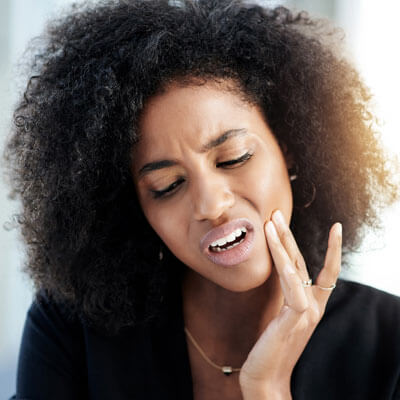Teeth Grinding in Noosa
 The habitual grinding of teeth, known as bruxism, presents a significant threat to oral health. This condition can manifest both awake and during sleep, often undetected.
The habitual grinding of teeth, known as bruxism, presents a significant threat to oral health. This condition can manifest both awake and during sleep, often undetected.
Identifying the Indicators and Symptoms
Recognising the signs of bruxism is critical for timely intervention. Indicators such as increased tooth sensitivity, worn dental surfaces, and cracked teeth or restorations could suggest this condition’s presence. Additionally, symptoms like jaw discomfort, headaches, and biting of cheeks might be significant. Disturbed sleep, rhythmic grinding sounds, and swollen cheeks further highlight the need for early detection and accurate diagnosis.
Effects on Dental Health, General Health, and Appearance
Bruxism’s impact extends beyond mere discomfort, leading to substantial damage to your teeth. Persistent pressure and friction can result in enamel degradation, chipping, and cracking, threatening oral health. Moreover, the intense force can cause fractures in natural teeth and dental restorations like fillings and crowns. Gum problems, including recession, add to the oral health complications caused by bruxism.
Beyond affecting oral health, bruxism also influences overall wellbeing. The tension it places on jaw muscles and joints can lead to headaches, facial discomfort, and temporomandibular joint (TMJ) disorders. Sleep disruptions due to night-time bruxism affect not only the individual but also their bed partner. Furthermore, aesthetic issues emerge from tooth damage altering your smile’s appearance, emphasising the need for comprehensive treatment.
The Advantages of Using Mouthguards for Bruxism
Mouthguards or dental splints provide a defensive solution against bruxism’s detrimental effects. These tailor-made oral appliances, crafted from sturdy materials, serve several purposes:
Force Absorption and Teeth Protection: Mouthguards absorb excessive forces during grinding, distributing pressure evenly and minimising the impact on teeth. They act as shock absorbers, preventing wear, chipping, and enamel degradation.
Jaw Muscle Relaxation: Mouthguards encourage a relaxed jaw position, helping alleviate muscle tension associated with bruxism. This can result in less discomfort and fewer headaches.
Preserving Dental Restorations and TMJ: Mouthguards act as a shield, safeguarding dental restorations from damage. They also promote a neutral jaw position, reducing strain on the temporomandibular joints and decreasing the risk of TMJ disorders.
While mouthguards can mitigate bruxism’s physical effects, it’s crucial to note that they do not tackle the underlying causes. Comprehensive treatment may involve stress management techniques and orthodontic adjustments. Regular upkeep and appropriate hygiene habits ensure the long-term efficacy of mouthguards in maintaining oral health.
Book Your Appointment Today
Safeguard your smile from harm. Contact Morton Dental today to schedule an appointment!
* Any surgical or invasive procedure carries risks. Before proceeding, you should seek a second opinion from an appropriately qualified health practitioner.

